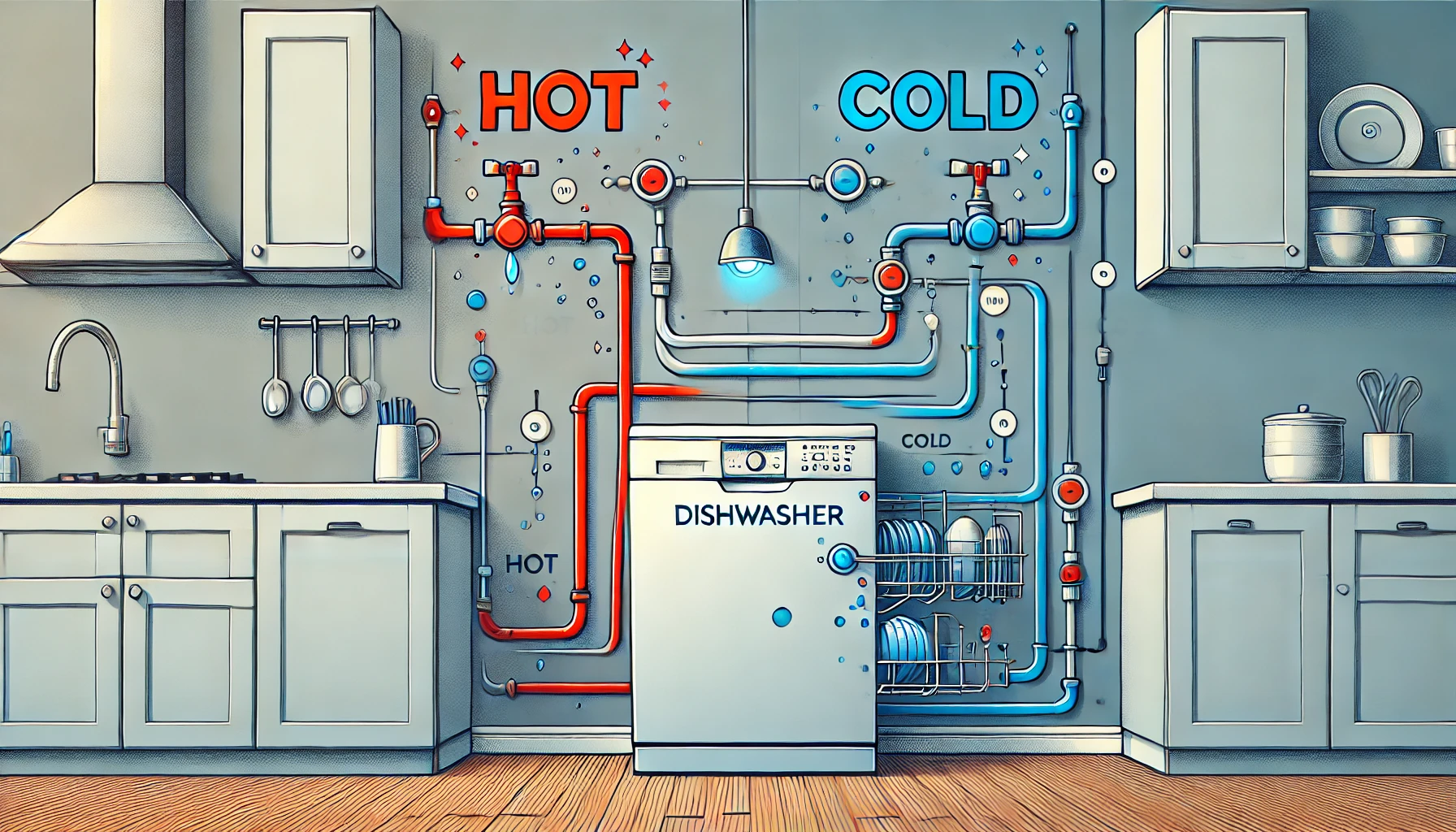Choosing between hot or cold water for your dishwasher depends on efficiency and performance. Hot water cleans better, speeds up cycles, and sanitizes more. Cold water saves energy in eco-friendly models with built-in heaters. Always follow manufacturer recommendations for the best results.
Let’s dive in.
Hot vs Cold Water for Dishwashers
Does a Dishwasher Need Hot Water?
Most modern dishwashers are designed to work with a hot water connection. Manufacturers recommend a hot water supply because:
- Efficient Cleaning: Hot water dissolves grease and food better, ensuring cleaner dishes.
- Faster Cycles: When connected to hot water, the dishwasher doesn’t need to spend extra time heating the water, leading to shorter wash cycles.
- Sanitization: Many dishwashers need high water temperatures for proper sanitization, especially in the final rinse.
Advantages of Using a Hot Water Supply
- Improved Cleaning Performance
- Hot water dissolves grease and grime more effectively.
- Reduces the reliance on the dishwasher’s internal heater.
- Energy Efficiency
- If your home has an efficient gas water heater, using the hot water supply may be more cost-effective than the dishwasher’s electric heating element.
- Sanitization Compliance:
- Many dishwashers require water temperatures of 120°F–140°F to meet sanitation standards
- Faster Cycle Times
- Connecting to a hot water line can reduce the overall washing time since the machine doesn’t need to heat the water from scratch.
- Better Drying
- Hot water aids in quicker drying by utilizing the residual heat.
Disadvantages of Using a Hot Water Supply
- Potential Damage to Dishwasher Components
- Some models, particularly those with built-in water softeners, can be damaged by prolonged exposure to high temperatures.
- Inconsistent Temperature Supply
- If your hot water takes time to reach the dishwasher, initial cycles may be less effective.
- Energy Waste
- If the dishwasher only uses a small amount of water, much of the hot water may sit unused in the pipes.
Can you run a cold water line to a dishwasher?
While some dishwashers can operate with cold water, this is generally not the recommended option. Dishwashers connected to cold water may experience:
- Longer Wash Times: The internal heating element will take longer to heat the water, extending cycle durations by 1–2 hours.
- Increased Energy Consumption: Heating water internally requires more electricity, which can drive up utility bills.
- Limited Cleaning Efficiency: Cold water might not break down tough stains or grease as effectively as hot water.
Advantages of Using a Cold Water Supply
- Compatibility with Eco-Friendly Cycles
- Many modern dishwashers are designed to run on cold water, heating it as needed for energy-efficient cycles.
- Reduced Risk of Component Damage
- Cold water is gentler on rubber seals and internal parts, leading to longer appliance lifespan.
- Lower Initial Plumbing Costs
- Easier to install in homes without an accessible hot water connection.
Disadvantages of Using a Cold Water Supply
- Longer Wash Cycles
- Dishwashers take longer to heat cold water to the required temperature.
- Higher Energy Bills
- Relying on the dishwasher’s internal heater may increase electricity consumption.
When Choosing Between Hot and Cold Supply Lines
When deciding between a hot or cold water connection for your dishwasher, consider these factors:
- Manufacturer Recommendations:
- Always check the user manual to confirm the recommended water supply type. Brands like Bosch, LG, and Miele typically suggest hot water for best results.
- Energy Source:
- If your home uses a cost-effective heating system such as gas or solar, hot water supply might be the better option.
- Dishwasher Location:
- The distance between your water heater and dishwasher plays a role in efficiency. Longer distances result in heat loss and wasted energy.
- Usage Frequency:
- Frequent dishwasher users may benefit from a cold water connection. It would allow them to use eco-friendly cycles.
Which Supply Line Is Right for You?
- Choose Hot Water If:
- You want quicker cycles and better drying performance.
- Your hot water source is energy-efficient.
- Choose Cold Water If:
- Your dishwasher is optimized for eco cycles.
- You want to prolong appliance lifespan and reduce component wear.
Frequently Asked Questions
Can I Switch from Hot to Cold Water Supply?
Yes, you can switch supply lines, but it’s crucial to check your dishwasher’s compatibility first. Some models might require modifications to function efficiently with a cold water connection.
Does Using Hot Water Damage Dishwashers?
No, as long as the water temperature does not exceed the recommended maximum (usually around 140°F). Some dishwashers even have a built-in temperature limiter to prevent damage.
Will a Cold Water Connection Save Money?
It might save money at first. But, longer wash cycles and more electricity to heat the water could erase any savings over time.
Final Thoughts
Choose a hot or cold water supply for your dishwasher. It depends on your needs, energy goals, and the manufacturer’s advice. Hot water is usually best for faster, better cleaning. But, cold water might work in eco-conscious homes with modern dishwashers.
If you’re installing a new dishwasher, check the plumbing layout and the distance to the water heater. This will minimize heat loss and ensure efficiency.



